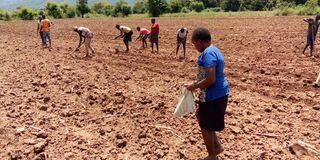Insecurity-hit Kerio Valley basks in economic transformation

The insecurity-hit Kerio Valley region is experiencing economic transformation as warring pastoral communities embrace irrigated agriculture as an alternative source of income.
They are investing in crop production along the rivers Kerio, Karenganyang and Suam, cultivating cereals, vegetables and fruits.
Livestock production has for decades been the main livelihood for pastoralist communities in the region.
But residents have faced recurrent food shortages due to prolonged drought that has undermined crop production.
Irrigation projects have boosted production after farmers invested in new crop production techniques following the return of calm in a region that was affected by cattle rustling and bandit activities over the years.
The irrigation schemes in Weiwei and Lomut in West Pokot County, Chepkuk and Kamusuwet in Elgeyo Marakwet, and Napuu in Turkana County have turned the area into a bread basket.
Weiwei Farmers Association chairperson Mark Meut said they have adopted strategies to combat hunger and improve the economy of the area.
Earn income
“We want to enable farmers to earn income so that they can pay school fees, improve their health and enhance agribusiness,” he said.
The association had signed a memorandum of understanding with Kenya Seed Company to improve production in the 2019-2020-2021 growing season. “We agree on fair prices [for seeds and fertiliser]. We use gravitational water from the river Weiwei during drought,” said Mr Meut.
Kerio Valley Development Authority (KVDA) Managing Director Sammy Naporos said his agency is supporting efforts to bring food security in the region as part of the government agenda in Asal areas
He said the KVDA was supporting 800 farmers on 108 acres.
Farmers at the Weiwei irrigation scheme, he said, are expecting 1,000 tonnes of maize seedlings that will be sold to Kenya seed companies and help generate 70 million this financial year to support the economy of the area.
Also read: IEBC meets editors ahead of August election
“Farmers who have been depending solely on pastoralism have shunned reliance on relief food from the government and other organisations,” Mr Naporos said.
He said authority had registered and facilitated farmers in cooperatives who can now grow crops.
“We want to expand Weiwei irrigation scheme phase three and set aside Sh200 million to help 800 farmers on 325 acres of land,” he said.
“The project has proved successful by providing food security and sustainable income generation to communities that have experienced recurrent starvation.”
He said the communities had embraced the projects because they realised they could benefit from them.
“The villagers now appreciate the nutritional value and economic potential of farming,” he said.
He said residents should be able attain food security and avoid relying on relief aid.
“The region has the potential to produce its own food if other organisations chip in [by] setting up irrigation schemes,” he said.
He said farmers have learned new farming methods that will help increase food production.
Drought tolerant crops
Mr Naporos said farming in Lomut is challenging as the area receives little rainfall, making it hard for crops to survive and for farmers to practice crop diversification.
“The major drought-tolerant crops grown in the area are sorghum and finger millet, which is not enough for both nutritional diet and income generation,” he said.
He said the soil in the area is fertile and ideal for growing various crops, adding that the irrigation project will create employment and reduce poverty levels in the region.
West Pokot Governor John Lonyangapuo, who visited the Weiwei irrigation scheme last week, said he was impressed with the progress made, adding that pests are a major challenge.
“The maize was planted in March and as a norm they plant three times a year,” said Prof Lonyangapuo.
He said heavy rainfall, floods and landslides that happened in 2019 had affected the water intake.





